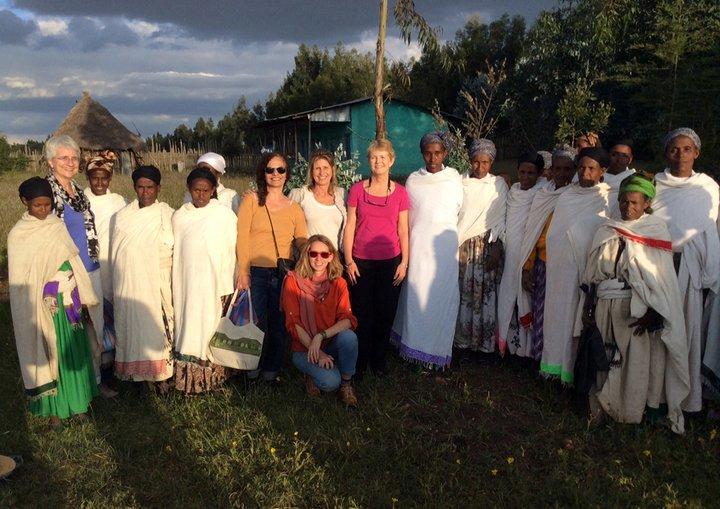Celebrating World Food Day with family farmers in Ethiopia

M. Ann Tutwiler, Director General, Bioversity International tells us about her recent visit to Ethiopia with the Board of Trustees, and how we are working with family farmers in the country through the 'Seeds for Needs' initiative.
Today we celebrate World Food Day. This year, the focus of World Food Day is on family farmers, a much-deserved recognition of the people who provide the majority of the food we eat, and especially of smallholder farmers, who provide over 80% of the food in many developing countries.
Earlier this week, several members of Bioversity International’s Board of Trustees and I visited some of the family farmers we are working with in Ethiopia.
Farming in Ethiopia is quite unique: many farmers cultivate teff, wheat and barley on relatively dry, high-altitude land. Frost and drought are common occurrences, ever more so with the increasing unpredictability of climate change. Many of the farmers we work with cultivate less than half a hectare of land. On this land, they must not only produce enough food to feed their families, but also enough to sell at a market.
Bioversity International is working closely with the Amhara Agricultural Research Institute to bring farmers high-quality seeds that better meet their needs. We have been working in Ethiopia through our ‘Seeds for Needs’ initiative since 2009. Under this initiative, 500 farmers are testing a diversity of barley and durum wheat varieties (most of which are traditional landraces that were in storage in Ethiopia’s national genebank), and evaluate the varieties based on their own criteria, which includes yield, but also drought and frost tolerance, growing season, tillering capacity, spike length, and straw residue.
Earlier this year, I helped to inaugurate the initiative’s first community seedbank in Ethiopia. This seedbank was requested by the farmers who wanted to have access to the landraces they evaluated through the initiative. Using their own labour, the farmers built the seed bank, and one of our partners, the Ethiopian Biodiversity Institute, is ensuring that the managers of the seedbank are properly trained so that it becomes a reliable source of good quality seeds for farmers in the area. Community seedbanks can play a vital role in conserving agricultural biodiversity. Being locally managed and close by, they empower communities to use and exchange both local and improved crop varieties that are important for their food security and livelihoods.
Participatory research is at the core of what Bioversity International does and is essential in order to put family farmers front and centre in the research-for-development agenda. Working together with farmers to come up with solutions that work for them, not only ensures that our research will have an impact, but also provides scientists with insights and local knowledge that otherwise remain inaccessible.
A key element of the ‘Seeds for Needs’ initiative is to combine scientific data together with the experiences and knowledge of farmers for mutual benefit. This requires a relationship of trust and respect, which we hope we are achieving in the communities where we work.
But how do we scale up? In Ethiopia, one option is to increase our scope by considering other important crops in the region, such as sorghum and teff. During the Board visit, one farmer also proposed that Bioversity International play a role in developing a market for the durum wheat they are growing.
The opportunities here will continue to evolve. But one message is clear: family farmers are an important part of creating a more productive and sustainable food system, but they can only be empowered if they are supported by inclusive institutions that help build their capacity to innovate. In Ethiopia, increasing the access and availability of locally-adapted seeds is one strategy that Bioversity International is using to strengthen farmers’ innovation capacity.
M. Ann Tutwiler
Email: [email protected]
Learn more about Bioversity International's 'Seeds for Needs' initiative and download our feature publication for World Food Day: Seeds for Needs - Papua New Guinea.
Photo: With women farmers in the field during our Board visit, Ethiopia. Credit: C. Samper
